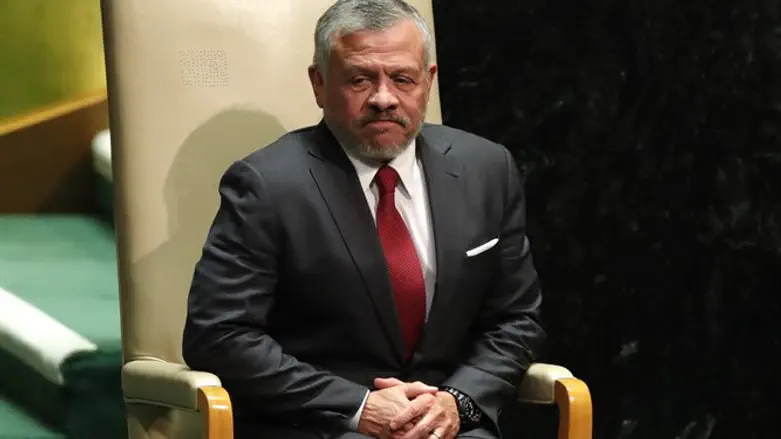
(JNS) Jordan’s foreign minister tried on Sunday to shed some light on the circumstances surrounding the nighttime arrests of certain senior officials following a failed coup attempt. But his comments created the impression that the main grounds for the drama were, at the most, conversations and plans that might have been cooked up secretly, rather than concrete actions. No tanks were rolling toward the royal palace in Amman, and King Abdullah’s throne was never in any real danger.
We can assume that if the king had had any real evidence that his half-brother Prince Hamzah was planning to overthrow him, he would have put him in prison rather than under house arrest. It is also possible that Abdullah could have denied shutting him in the palace, if it hadn’t been for a leaked video that Hamzah managed to smuggle out.
Over 50 years ago, professor Manfred Halpern, one of the most important Middle East researchers of all time, predicted that the fate of the kings in the region had been sealed, and that they would disappear within a few years. Of course, he was wrong. The “Arab Spring,” which deposed long-reigning tyrants like Hosni Mubarak in Egypt and Muammar Gaddafi in Libya, miraculously skipped over the monarchies and left all the kings on their thrones, from Morocco in the west to Saudi Arabia and the Emirates in the east.
But that same Arab Spring, or winter, left the surviving royals more worried than ever. They commanded their intelligence services to keep an eye open for any suspicious chatter or undesirable gatherings.
At least some of them are convinced that the main danger to their rule comes not from their militaries and security apparatuses, but from closer to home. A year ago, Mohammed bin Salman, son of King Salman of Saudi Arabia, ordered the arrest of three members of the royal family, including two high-ranking princes, on charges of planning a coup. On Saturday, King Abdullah took exactly the same action when he ordered Hamza to be placed under house arrest.
The kings’ fear of their own extended families overlaps with their natural desire for their sons, rather than other family members, to inherit their crowns. There are plenty of examples. Less than four years ago, King Salman ousted his nephew, Mohammed bin Naif, to name his son, bin Salman, heir to the throne. Jordan’s former King Hussein, on his deathbed, passed over his brother Hassan to name his own son Abdullah his heir.
And following the tradition of giving his son preference over other relatives, King Abdullah II took care to ensure that not Hamza but his own eldest son Hussein would become king. Only last month, Hussein tried to anchor his status by sparking a spat with Israel about the number of security guards who would accompany him on a visit to the Temple Mount.
As of Sunday afternoon, it still is not clear how far Hamza was prepared to go, aside from his confession in the leaked video that he had not been part of any coup attempt and had only voiced criticism about years of corruption in the upper echelon of the kingdom.
But the king’s hasty response and the nighttime arrests show how enormously sensitive the Jordanian royal family is about any attempt to topple the king. There are a few reasons for this: First, the difficult situation in Jordan, which is battling COVID-19 and an economic crisis and is having difficulty coping with a huge deficit and high unemployment. (The economy received a bit of relief from the decision of the U.S. Congress to cancel former President Donald Trump’s withdrawal of foreign aid to Jordan.)
Another reason has to do with the fact that Hamza, 41, is well educated, has an impressive military record as a commander in the country’s armed forces and is more popular and charismatic than Crown Prince Hussein bin Abdullah. Hamza also enjoys the support of a few of the tribal leaders in Jordan, who are the mainstay of the kingdom’s ruling elite. During the wave of demonstrations that erupted across Jordan some three years ago over the economic crisis, Hamza’s name was raised as someone more worthy than Hussein to succeed Abdullah.
In deciding to clip Hamza’s wings and remove any threat, real or imagined, to his rule, King Abdullah had the full support of the United States, the west, and most countries in the Arab world. The calming messages Amman sent Jerusalem about the stability of the kingdom’s government show that despite the diplomatic tension between the two countries, the king places great importance on backing from Israel.
Oded Granot is a journalist and international commentator on the Middle East.
This article first appeared in Israel Hayom.